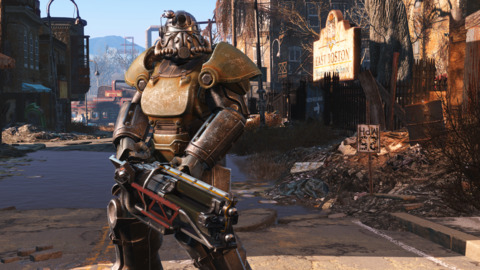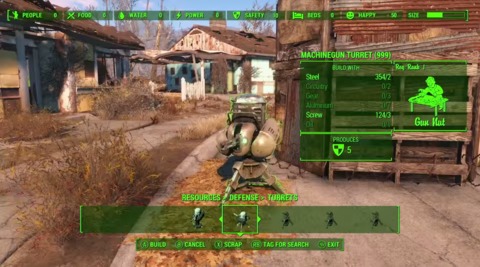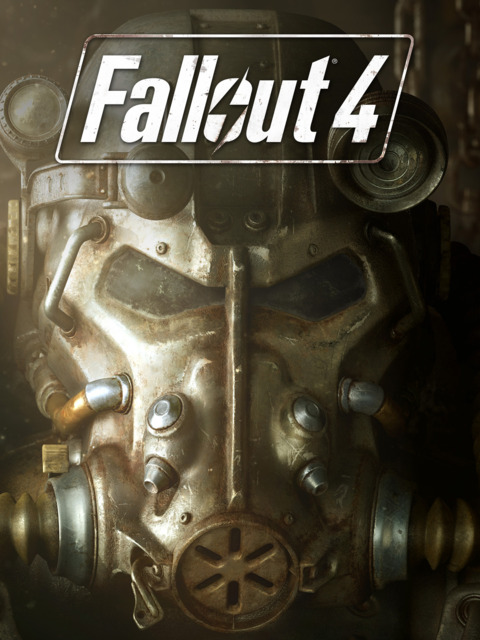Fallout 4 Review

There’s a unique brand of excitement that follows the announcement of an open world Bethesda game. Sure, they launch with more bugs than there are in the Amazon, but no other game matches the level of freedom and intricacy Skyrim or Fallout 3 boast. Almost every item can be taken. Almost every character can be killed. They’re worlds with seemingly endless possibilities. Fallout 4 checks all the boxes for what to expect from a Bethesda open world and offers some new mechanics to boot. But as I introduced myself to this strange—yet—familiar world, a question kept tickling the back of my mind: is that enough anymore?
Fallout 4 sets the stage moments before the bombs fall, with you and your darling spouse and baby boy enjoying a quiet afternoon. But the serenity doesn’t last for long, and soon you and your family join everyone else in a race to the nearest refuge — Vault 111. But things don’t go exactly as planned when you and your family are cryogenically frozen as part of some freak experiment. A couple of events later, and you wake up approximately 200 years later with a dead spouse and missing son. Being the responsible parent that you are, you set off into an irradiated Boston Commonwealth to get your boy back.
Upon opening the door of Vault 111, you’re greeted with the open world we’ve come to expect from Bethesda. There’s abandoned houses with untold secrets. Denizens of bustling settlements gossip about cyborgs disguised as humans stealing away loved ones for a shadowy organization known only as “The Institute.” Armor-clad soldiers carrying the Brotherhood of Steel emblem stomp across the wasteland in search of pre-war technology — and melting anyone who doesn’t relinquish it with a laser rifle.
It’s a living, breathing world for sure, yet I couldn’t help but feel like Fallout 4 lost some of the freedom New Vegas delivered. Having a silver tongue won’t get you as far in Boston as it did in Nevada, and you can’t rely on high intelligence or dump points into medicine to unlock new options in story missions. Shooting someone in the face became the de facto solution in most of the quests I encountered. It’s not a bad solution, but it was disappointing to find it being the only solution more often than not.

Part of that might have to do with the game’s new leveling system. Fallout 4 removes skills like “small arms” or “speech” found in Fallout 3, and instead gives you a chart of perks you can choose from depending on your S.P.E.C.I.A.L. base stats. Each level up gives you a point to spend on a perk or add a point into a base stat. If you want to carry everything without worrying about encumbrance, boost your strength and unlock the perk that adds additional carry weight. If skulking in the shadows is more your style, pick one of the perks that improves your sneaking in the Agility column. It’s a neat system that helps alleviate one of Fallout 3 and New Vegas’ more egregious problems — shooting.
Firing a gun in those games was akin to rolling dice. Investing points into “small arms” didn’t necessarily make shooting a pistol feel better, it just lessened the chance that your bullet would exit the chamber at a 45-degree angle. Consequently, the turn-based combat system, VATS, became a necessity rather than an alternative. Thankfully, Fallout 4 has more or less resolved this issue. There are plenty of ways to become a better killer during your time in the wasteland, but your bullets will typically hit their mark if your aim is true from levels 1 to 50. That’s progress.
But the biggest change to the formula is the new base-building mechanic. Shortly after you leave the vault, the leader of a new faction called “The Minutemen” asks you to build a settlement in the ruins of your hometown. The settlement requires food, water and electricity to keep your settlers fat and happy along with whirring turrets to protect them. Future quests with that faction have you building radio beacons to attract other settlers, that can then harvest more food, and man other defenses.
There are workshops that break down all the junk you find across the wasteland in raw materials that can be used to upgrade your weapons, armor and settlement. It’s a system I could see myself dumping hours had Bethesda offered any kind of reason to build and expand said settlements. Or made managing the settlement less of a headache. Or offered a tutorial that explains anything beyond “here’s how you get food, water and power.” Or explained what, if any, reason there was to build and maintain a settlement in the first place.
But rather than taking the time to guide you through the more advanced systems (perhaps in an optional quest) the game just dumps you with the clunkiest UI you’ve ever seen, waves goodbye and drives off in a mini-van never to be seen again. I’ve seen videos of people who took the time to learn everything make wondrous things. That’s great, but it’s disappointing that Bethesda spent so little time explaining the one, real new thing separating Fallout 4 from its predecessors.

I did, however, fall in love with modifying my guns and armor. I loved taking new weapons and gear back to my settlement and seeing what kinds of modifications I could make. I loved tinkering with my plunder to see which upgrades catered to my specific playstyle. Hell, I upgraded weapons I knew I’d never normally use just because I could. No, adding mods to guns an armor isn’t a particularly new concept. But it’s an engrossing piece of customization that I can’t see missing in any future Fallout game.
But most of my enjoyment came from exploring the vast open world and discovering the secrets it had to offer. I solved mysteries with cyborg-detective Nick Valentine, helped a band of robots fix their jet-powered, 18th century-style ship, and investigated a settlement that tests if someone’s a synth Bladerunner-style before granting passage. Aside from the “go here, kill this person” quests some factions endlessly offer, I enjoyed pretty much everything I was tasked.
Still, I can’t help but feel disappointed as well. Given this is Bethesda’s first game on current-gen consoles, I expected it to advance the series in some fashion. Maybe use the additional horsepower to create a type of quest impossible to achieve on older tech.
Instead, Fallout 4 seems like just another Fallout game with one poorly explained new mechanic and a slightly fresher coat of paint. Improved lighting and character models separate Fallout 4 from the dead-eyed robots that inhabited Bethesda’s previous games, yet few of the game’s textures hold up upon closer inspection.
The player character actually has a voice this time, but the writing fails to flesh them out into a real character. Given your character lived most of his waking moments before the bombs fell, you’d expect him to react to Super Mutants and Deathclaws with some incredulity. Bethesda could have had some fun introducing the craziness of the Fallout series to a character that’s relatively alien to it. But instead you get a character who accepts talking ghouls and two-headed cows as reality without raising an eyebrow. It’s like you’re playing as someone who’s already played the previous Fallout games.
Then, of course, there are the bugs. Characters still clip through walls, objects you build in settlements will hover in mid-air and all the rest of the open world jank you’ve come to expect from these games is all in place. But even though I knew those bugs would be there, it’s still disappointing to see little improvement on the stability front.
War never changes, but the Fallout series could sure as hell use some more.
